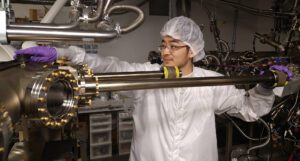Xiao has been working on several projects in Prof. Zetian’s Mi’s group, including micro LED technology and renewable energy.


Xiao has been working on several projects in Prof. Zetian’s Mi’s group, including micro LED technology and renewable energy.
Next-gen computing material gets down to the right size for modern manufacturing.
The post Nanoscale ferroelectric semiconductor could power AI and post-Moore’s Law computing on a phone appeared first on Michigan Engineering News.
Led by Prof. Becky Peterson, the research focuses on a category of materials important for low power logic operations, high pixel density screens, touch screens, and haptic displays.
The post Scalable method to manufacture thin film transistors achieves ultra-clean interface for high performance, low-voltage device operation appeared first on Michigan Engineering News.

Elaheh Ahmadi, David Blaauw, Michael Flynn, Hun-Seok Kim, Hessam Mahdavifar, and Zhengya Zhang bring their expertise and creativity to this nationwide undertaking in the area of semiconductors and information & communication technologies.
Withstanding high temperatures and the light of 160 suns, a new catalyst is ten times more efficient than previous sun-powered water-splitting devices of its kind.
The post Cheap, sustainable hydrogen through solar power appeared first on Michigan Engineering News.
Dr. Mehdi Saligane, a leader in the open-source chip design community, was among the first researchers to fabricate a successful chip as part of Google’s multi-project wafer program.
The post Open-source hardware: a growing movement to democratize IC design appeared first on Michigan Engineering News.
When a person’s cognitive function is highly variable, they’re likely to be more infectious and have more symptoms after exposure to a respiratory virus.
The post A brain game may predict your risk of infection appeared first on Michigan Engineering News.

As part of the U-M Engineering Global Leadership (EGL) Honors Program, Electrical Engineering undergrad Nora Desmond traveled There and Back Again to experience the sustainability culture of New Zealand.

In a partnership with Ecoworks, Pecan Street, and Jefferson East, Prof. Johanna Mathieu is helping create a better process for Detroit homes to benefit from decarbonization, electrification, and renewable energy integration.
The SCISCCO system could better monitor brain and organ metabolism, helping to diagnose concussions, monitor cerebral metabolism in traumatic brain injury patients, and gauge the response of organs to treatments in an operating or emergency room scenario.
The post New non-invasive optical imaging approach for monitoring brain health could improve outcomes for traumatic brain injury patients appeared first on Michigan Engineering News.